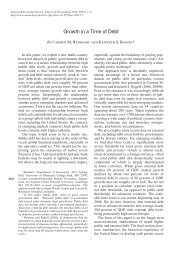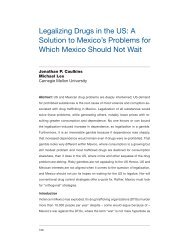The collapse of global trade, murky protectionism, and the crisis:
The collapse of global trade, murky protectionism, and the crisis:
The collapse of global trade, murky protectionism, and the crisis:
Create successful ePaper yourself
Turn your PDF publications into a flip-book with our unique Google optimized e-Paper software.
<strong>The</strong> <strong>collapse</strong> <strong>of</strong> <strong>global</strong> <strong>trade</strong>, <strong>murky</strong> <strong>protectionism</strong>, <strong>and</strong> <strong>the</strong> <strong>crisis</strong><br />
orders for Airbus planes.<br />
While <strong>the</strong> very rapid <strong>and</strong> very large increase in such spending makes this a pressing<br />
problem, <strong>protectionism</strong> in government procurement is an old problem, as Steven<br />
Schooner <strong>and</strong> Christopher Yukins, <strong>the</strong> authors <strong>of</strong> Chapter 17 point out. <strong>The</strong> methods<br />
<strong>of</strong> reducing such biases <strong>and</strong> inefficiencies are equally well known <strong>and</strong> Chapter 17 lists<br />
<strong>the</strong> most important recommendations for national leaders to adopt.<br />
<strong>The</strong> <strong>murky</strong> nature <strong>of</strong> this protection makes it hard to enumerate. Worse, <strong>the</strong> lack<br />
<strong>of</strong> transparency makes it harder for politicians to resist retaliation against a trading<br />
partner's measures. <strong>The</strong> automotive sector bailouts announced or discussed following<br />
<strong>the</strong> US discussion prove a deliberate pattern <strong>of</strong> retaliation/reaction. After <strong>the</strong> US started<br />
talks on a massive bailout <strong>of</strong> US automakers, Britain, Canada, France, Germany,<br />
Italy, Russia, Sweden <strong>and</strong> China are all considering or have implemented auto-industry<br />
bailout measures. President Sarkozy recently remarked "<strong>The</strong> situation in Europe<br />
means that you cannot accuse any country <strong>of</strong> being protectionist when <strong>the</strong><br />
Americans put up $30 billion to support <strong>the</strong>ir automotive industry."<br />
What should leaders at <strong>the</strong> G20 summit do?<br />
Protectionism is creeping into national policies <strong>and</strong> <strong>trade</strong> volumes are collapsing,<br />
bringing down manufacturing employment. So far <strong>the</strong> causality is mostly one way.<br />
Apart from <strong>the</strong> auto <strong>and</strong> banking sectors, <strong>the</strong> <strong>protectionism</strong> seems to be a reaction to<br />
job losses, not reactions to o<strong>the</strong>r nations' protection. This ebook proposes a number<br />
<strong>of</strong> preventive measures that G20 leaders should embrace to ensure that this relatively<br />
benign situation does not deteriorate.<br />
As President Zedillo stresses, time is <strong>of</strong> <strong>the</strong> essence. To allow <strong>the</strong> stimulus packages<br />
to work, to allow <strong>trade</strong> to start to play a positive-feedback role, it is crucial that a protectionist<br />
spiral is avoided – especially during <strong>the</strong> next nine months when governments<br />
are hoping <strong>the</strong>ir stimulus spending will begin turning around <strong>the</strong> <strong>global</strong><br />
slump. <strong>The</strong> concrete proposals fall into three categories:<br />
• St<strong>and</strong>stills <strong>and</strong> Surveillance<br />
• Exit Strategies<br />
• Zedillo's 'aggressive deterrence' approach<br />
• Getting Doha back on track<br />
• Resisting green <strong>protectionism</strong><br />
St<strong>and</strong>stills <strong>and</strong> surveillance<br />
<strong>The</strong> G20's current st<strong>and</strong>still on <strong>protectionism</strong>, agreed less than five months ago in<br />
Washington, is in tatters. While no one has imposed across-<strong>the</strong>-board <strong>trade</strong> restrictions,<br />
many national economic recovery programmes contain discriminatory measures.<br />
Chapter 14 – jointly authored by renown <strong>trade</strong> experts from India, China, Brazil,<br />
Costa Rica, Britain <strong>and</strong> Germany – proposes a very specific streng<strong>the</strong>ning <strong>of</strong> <strong>the</strong><br />
G20's protection st<strong>and</strong>still contained in <strong>the</strong> Washington declaration. This proposed<br />
"Protocol on state intervention during <strong>the</strong> current <strong>global</strong> economic downturn" covers<br />
<strong>the</strong> new, murkier forms <strong>of</strong> protection as well as traditional discriminatory measures,<br />
<strong>and</strong> it proposes that <strong>the</strong> commitment be backed up a tough real-time surveillance<br />
mechanism. <strong>The</strong> goal is not to stop governments from intervening, but ra<strong>the</strong>r to<br />
5





